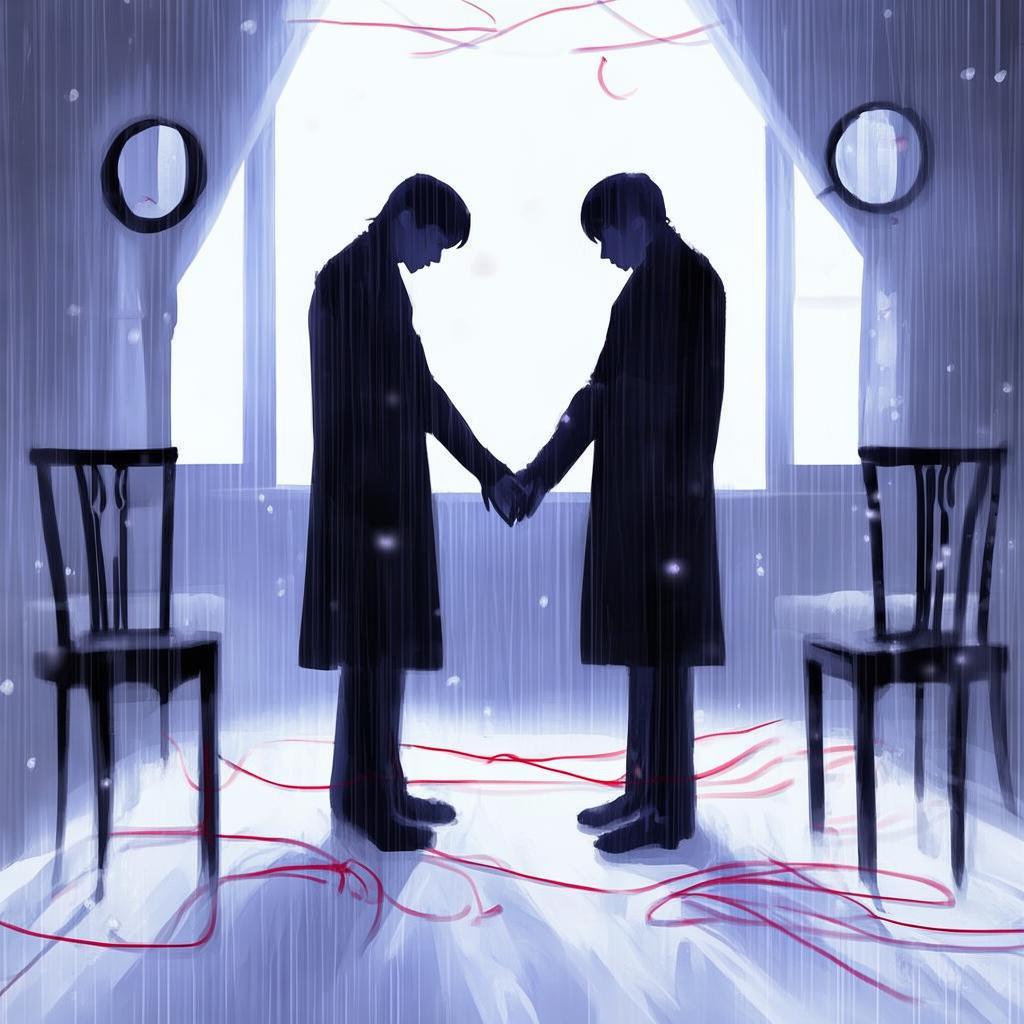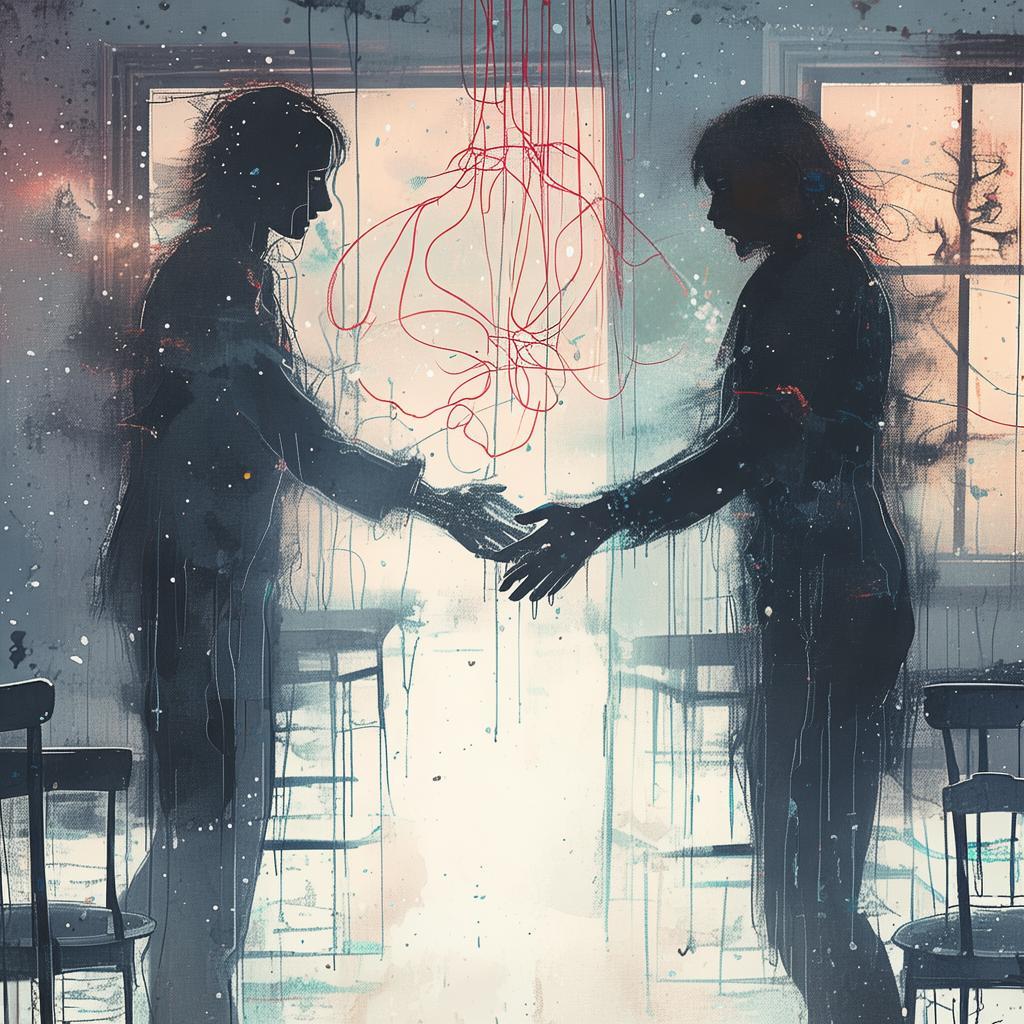Shadows on the Stage: A Tale of Love and Vanishing Acts
In the heart of the bustling city, where the glow of the limelight never dimmed, there was a theater that stood as a beacon of art and passion. Its stages were the canvas upon which dreams were painted and the hearts of thousands were captivated. Amongst the actors, singers, and dancers, two souls were destined to dance together in the shadows of the spotlight: Liang Wei, a charismatic actor, and Mu Chen, a brilliant stage director.
Liang Wei was a living legend in the theater world. With his piercing eyes and magnetic charm, he could make any part come alive, but it was his portrayal of the tragic hero in the play "The Vanishing Actor" that left audiences breathless. The role was a perfect fit for him, a mirror reflecting his own life—fascinating yet shrouded in mystery.
Mu Chen, on the other hand, was the architect of dreams, the maestro of the stage. His vision was unparalleled, and his hands could weave the most beautiful tapestries of story and emotion. It was a rare occurrence when he chose to direct, but when he did, it was a testament to his belief in the story and the actors involved.
Their partnership was a symphony of passion and creativity, a love that transcended the bounds of their professional lives. They were like two halves of a whole, each needing the other to fulfill their true potential. Yet, as the opening night of "The Vanishing Actor" approached, whispers of a scandal began to circulate. It was said that Liang Wei, the vanishing actor, was destined to disappear before the final curtain.
The night before the opening, the actors gathered in the dimly lit rehearsal room. The tension was palpable as they prepared for their final run-through. Liang Wei stood in the center, his gaze fixed on the stage, as if he were already a part of the play. Mu Chen approached him, concern etched on his face.
"Are you sure about this, Liang?" Mu's voice was barely a whisper.
Liang turned to him, a hint of vulnerability in his eyes. "I have to do it, Mu. It's part of the story. It's part of me."
As the night wore on, the actors continued their preparations, but a sense of dread settled over them. Just before the curtain was due to rise, Liang Wei vanished. The theater was plunged into darkness, and the audience erupted in shock. Mu Chen rushed onto the stage, his mind racing with possibilities.
Hours passed, and Liang Wei still hadn't reappeared. The police were called, and a full-scale investigation ensued. Theories abounded: a publicity stunt, a personal vendetta, or perhaps something far more sinister. As the investigation deepened, the lines between reality and fiction began to blur.
The play went on without its star, a testament to the resilience of art. Mu Chen stood on the stage, his heart heavy, as he directed the cast through the final act. The audience was captivated, their attention drawn to the emotion and passion that poured from the actors.
In the aftermath, Mu Chen discovered that Liang Wei's disappearance was not a mere act of drama. It was a deeply personal tragedy, rooted in the actor's past. Liang had been hiding a secret that threatened not only his own life but also the lives of those he loved. The truth was a harrowing tale of betrayal and loss that had driven him to the brink of madness.
Mu Chen, with the help of the cast and crew, embarked on a quest to uncover the truth. They traveled to Liang's hometown, a quaint village shrouded in mist and memories. There, they discovered the remnants of a love story that had never seen the light of day. Liang's heart had been torn apart by a love that could never be, and his vanishing act was a desperate attempt to escape the pain.

As Mu Chen and the cast delved deeper into Liang's past, they uncovered a web of deceit that reached into the highest echelons of the theater world. The truth was more twisted and tragic than any play they had ever performed. And at the heart of it all was the love that had driven Liang Wei to his breaking point.
In the end, it was Mu Chen who had to confront the most difficult decision of his life. He had to choose between the love he had found in Liang Wei and the life he had built with him. The climax of their story was a heart-wrenching moment of truth, where the line between reality and fantasy became indistinguishable.
The play's final act was a reflection of their lives—filled with love, loss, and the unyielding power of the human spirit. As the curtain fell, the audience erupted into applause, their emotions still raw from the profound story they had witnessed.
In the days that followed, Liang Wei returned to the stage, not as the vanishing actor but as a man reborn. His performance was a testament to his resilience, a message of hope in the face of adversity. And Mu Chen, with a newfound understanding of love and loss, stood by his side, their bond stronger than ever.
Their story was a reminder that love could be found in the most unexpected places, and that even the darkest of times could be illuminated by the light of hope and understanding. As the theater lights dimmed, and the world outside the stage became silent, Liang and Mu knew that their love had triumphed, and their journey was just beginning.
✨ Original Statement ✨
All articles published on this website (including but not limited to text, images, videos, and other content) are original or authorized for reposting and are protected by relevant laws. Without the explicit written permission of this website, no individual or organization may copy, modify, repost, or use the content for commercial purposes.
If you need to quote or cooperate, please contact this site for authorization. We reserve the right to pursue legal responsibility for any unauthorized use.
Hereby declared.









